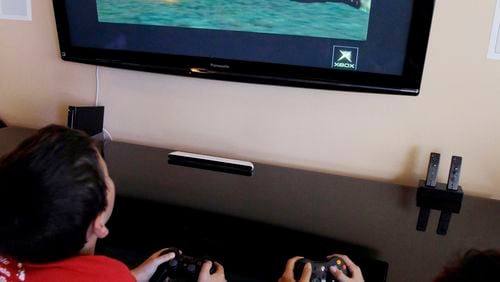An elementary school in Oregon announced it will no longer assign homework. A similar policy decision by a Texas second-grade teacher went viral on Facebook three weeks ago and earned national applause, reflecting growing parental exasperation with homework.
The new schoolwide policy at Cherry Park Elementary in East Portland grew out of teacher research on the value of homework. Here is an excerpt of the news story in the Oregonian by education reporter Betsy Hammond, who used to write about education for the AJC: (Find full story here.)
Why ban homework? A team of teachers at Cherry Park Elementary in the David Douglas school district in East Portland dug into the research and found that, while high school students learn more when they do homework, for elementary pupils, there is little to no evidence homework does any good.
Principal Kate Barker says assigning regular homework isn't a fabulous idea at any elementary school, but especially not at Cherry Park, where at least 75 percent of students live at or below the poverty line and families speak more than 30 different languages. "We find that homework really increases that inequity," Barker said. "It provides a barrier to our students who need the most support."
When I wrote about the Texas teacher's no homework announcement, I talked to Duke University professor Harris M. Cooper, a national expert on time and learning. While he agrees homework in the lower grades is unlikely to spur great academic gains, Cooper maintains there is value to homework appropriate to a child's age and development.
"You are never going to show an enormous effect on achievement from homework with a second grader. But homework can have possible effects on learning and study habits, time management and on the parents' ability to see what their child's strengths and weaknesses are. It is helpful to think about homework the same way you think about prescribed medication or a dietary supplement. Take too little of it and it won't have any effect at all. Take too much and it can kill you," he said.
Despite the growing laments about too much homework, the Brown Center Report on American Education found that except for 9-year-olds -- who used to have no homework and now have some -- the homework load has remained stable since 1984. That doesn't mean parental complaints about too much homework are invalid, but they are atypical, according to the report.
I also interviewed Cathy Vatterott, an education professor at the University of Missouri-St. Louis who has been researching, writing, and speaking about homework for almost 20 years. Among her books: " Rethinking Homework: Best Practices That Support Diverse Needs."
She said homework can be helpful, if it is good homework that addresses the child's needs and learning style. She gives the example of teaching the multiplication tables and assigning practice multiplying by 7 for homework that week. One child may decide to recite the multiplication table to learn it, while another may write it down and still another may use a grid. "Homework should be about asking kids what they need to work on and then kids coming back and setting their own goals," she said.
The Oregon school wants its students to do outdoor and family activities instead of homework, but will kids enjoy board games with their families, play outside or read more? I would be curious what research will eventually tell us about how kids spend the time freed from nightly homework.
I suspect more screen hours may be one outcome of homework-free afternoons and evenings. Research finds kids ages 6-11 spend about 28 hours a week in front of the TV. And 71 percent of 8- to 18-year-olds now have a TV in their bedroom. Studies show American parents are now giving their kids their first real cellphones at age 10.
What do you think? Should Georgia elementary schools adopt homework bans?







